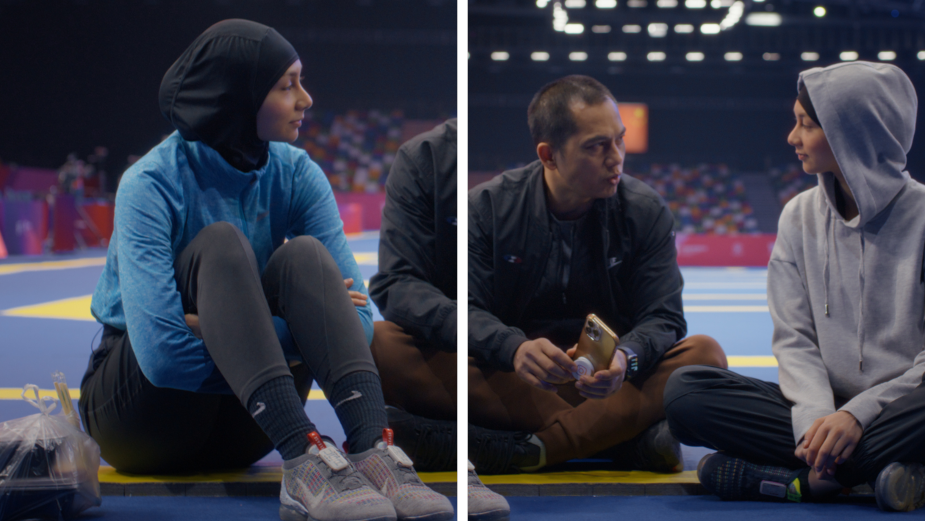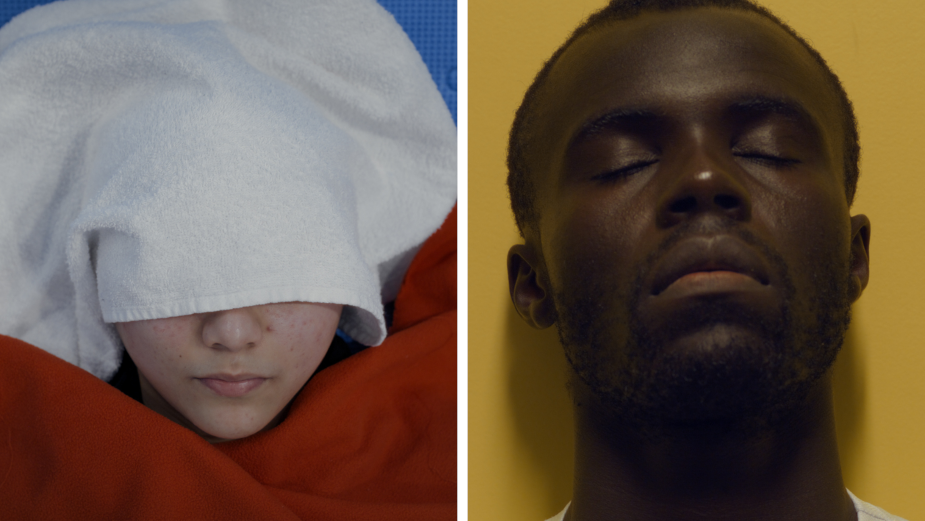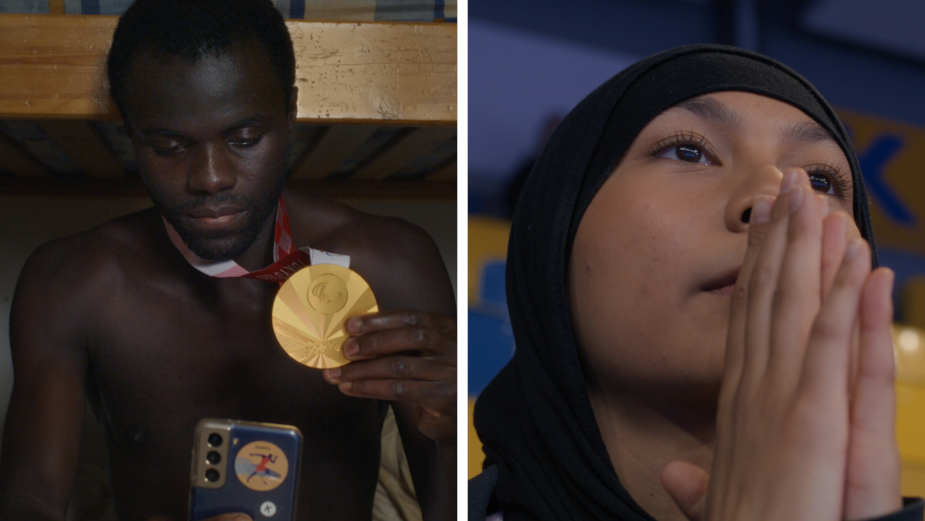
Nike Inspires a New Generation of French Athletes in “Ultimate Olympic Underdog Movie”

Seven years in the making, this cinematic journey by We Are Pi and Nike promises to be as compelling as the athletes it portrays.
We Are Pi has recently debuted the trailer for ‘Crois Pas Qu’on Dort’ (‘Don’t Think We’re Sleeping’), an extraordinary documentary that shines a spotlight on the relentless spirit of three French athletes as they chase their Olympic Dreams – Charles-Antoine Kouadio, a gold medalist with an intellectual disability, and twin sisters Leyna and Maysane Lounissi, poised to make their mark in taekwondo.
Premiering in mid-January 2025, this film is more than just a sporting chronicle; it’s a testament to the transformative power of perseverance and passion. ‘Crois Pas Qu’on Dort’ offers an intimate glimpse into the lives of the three athletes – from the heart of Paris to its vibrant suburbs, the film follows its three protagonists through five years of their lives. Directors Nick Walters and Lou Marillier beautifully capture not only their athletic ambitions, but also the everyday changes and triumphs that define their journeys.
Supported by Nike and brought to life with a powerful soundtrack featuring exclusive music by French hip-hop artist Tiakola, the film aims to inspire a new generation of underdog athletes and advocates. The ‘Crois Pas Qu’on Dort’ pledge also underscores a commitment to diversity in filmmaking, reflecting the vibrant communities represented on screen, behind it. As we gear up for its release, ‘Crois Pas Qu’on Dort’ stands as a celebration of dreams, resilience, and the unyielding pursuit of excellence.
Founder of We Are Pi Alex Bennett Grant and film producer at Pi Studios James Emtage tell LBB’s Zoe Antonov more about the trials and tribulations of the seven-year-long production process.
LBB> This project started seven years ago, if not more. Can you go back to the beginning and tell us how that happened? Did Nike contact you, was there a brief, what was the goal from the start?
Alex> Nike wanted to help tell athlete stories in different ways, and when Paris was awarded the Olympics we decided to create the film to invite a new generation of athletes in France into sport by inspiring them with the stories of our protagonists. The question was ‘How to approach communicating to the next generation of athletes in an innovative way, and continuously as opposed to only during the games?’. From there we wrote a treatment and followed a pretty classic film development process of extensive casting and test shoots. The idea took form as we uncovered real athlete stories, not by scripting them in advance. Full support from Nike came about after the initial pilots proved the incredible potential to tell athlete stories differently.
LBB> Once you knew that you'd create the project with the help of Nike, how did you pick the three protagonists you wanted to profile in the film and what were you looking for in them?
Alex> We looked at over 500 people for the casting, a process that took over two years. We set about to tell the next generation underdog athlete story from the real neighbourhoods they live in, which is often far from the tourist centre of Paris, and found in the greater Paris region. To become a touchstone for a generation, it was also important that we would see them coming of age in the film and to do that we needed more intimate access to their lives in and outside sport. We worked with a variety of official casting agents, as well as community representatives to find the often unknown, up-and-coming athletes. To make a movie with fresh depth and storytelling, we were looking for people's personalities and rich lives as much as athletic potential.

LBB> Over the course of five years, you followed these people as a crew and filmed them, recording their stories and lives. How big was the crew, where did you live and how did the practicality of this work?
James> We wanted to create an intimate and true portrayal of the lives of our three athletes and the people around them, so we kept those on shoots to an absolute minimum in order to blend in with the environment and not distract the moments of real life that we were capturing. Our cast got to know the directors (Nick Walters and Lou Marillier) and crew really well, building up a complete trust in their work which led to them being more and more natural with the cameras around them as the years of filming went on.
We partnered with a Paris line production company, Soldats, who recruited all of our crew, and with their help we created the ‘Crois Pas Qu’On Dort Pledge’ which worked to recruit and train under-represented film makers to be part of the production team. This was important to us as we wanted the film to be made by a cohort of filmmakers who were reflective of our cast and their communities – we never wanted this to feel like a film being made about some young people from the banlieues.
We wanted it to feel like a film made with some young people from the banlieues, and we feel that authenticity is reflected in the footage. Despite having a small and tight team on set, over the two years of casting and five years of filming we have amassed a roll call of over 250 people who have worked on the project, so it’s been a huge and varied cast of talents who have come together to create this.
We partnered with a Paris line production company, Soldats, who recruited all of our crew, and with their help we created the ‘Crois Pas Qu’On Dort Pledge’ which worked to recruit and train under-represented film makers to be part of the production team. This was important to us as we wanted the film to be made by a cohort of filmmakers who were reflective of our cast and their communities – we never wanted this to feel like a film being made about some young people from the banlieues.
We wanted it to feel like a film made with some young people from the banlieues, and we feel that authenticity is reflected in the footage. Despite having a small and tight team on set, over the two years of casting and five years of filming we have amassed a roll call of over 250 people who have worked on the project, so it’s been a huge and varied cast of talents who have come together to create this.
LBB> As you were filming them, was there a narrative goal to the production, or were you just seeing what happens and looking to portray a realistic profile of the athletes?
James> Our directors Nick and Lou had a clear narrative goal throughout: to create a coming-of-age story told through the prism of a sporting dream, and the world of possibilities that that creates for Leyna, Maysane and Charles-Antoine in their formative years.
None of us could predict what those experiences would be when we started filming with them in 2019, so to a large extent, we just had to see what happened and roll with it. However, the close and collaborative relationship between the cast and the directors allowed them to navigate this time together and to decide which stories within their lives to focus on; those stories that would allow us to capture something honest and specific to them, and that we hope will also speak to many other people.

LBB> How did the relationship between the athletes, the crew, and the film itself develop? Were there any frustrations or highly emotional moments along the way?
James> It should never be underestimated how much time and commitment documentary directors put into their subjects, and our directors developed incredibly close relationships with the cast, their families and friends from years of time spent with them.
The wider networks of the cast, for example Charles-Anotine’s coach Vincent, or Leyna and Maysane’s parents Ekvara and Fatima, were crucial in nurturing those relationships too, and for continually enabling access to everything from family birthday parties to international competitions. There was a constant challenge to keep one step ahead of everyone’s movements, so we could ensure we were in the right place at the right time to capture a key moment as it happened.
Our own emotional journeys probably mirror the emotional moments of the cast’s stories – watching Charles-Antoine win gold in Tokyo but not get placed in Paris, or watching the twins get ranked number one in France but not make selection to the Paris Olympics. We’ve ridden their rollercoasters with them for five years now and that’s led to us feeling all of their highs and lows too.
Our own emotional journeys probably mirror the emotional moments of the cast’s stories – watching Charles-Antoine win gold in Tokyo but not get placed in Paris, or watching the twins get ranked number one in France but not make selection to the Paris Olympics. We’ve ridden their rollercoasters with them for five years now and that’s led to us feeling all of their highs and lows too.
LBB> When you profile people in a documentary, especially athletes preparing for the Olympics, anything can happen. What were some unexpected moments, the unforgettable parts of the filming process that really altered the film's trajectory?
James> The most unexpected moment in the five years of filming was when Charles-Antoine went to the Tokyo Paralympics, in the middle of the covid pandemic with all of its lockdown and isolation rules, and won gold. He was a relatively unknown athlete and not one who anyone was particularly watching, so having this moment land at the midpoint of his story really altered the film’s trajectory – he was now going into Paris, the Paralympic Games in his home city, as the marked man and the one to beat. This just goes to show how sport can change someone’s life and equally how sport is a series of wins, losses and beautiful surprise moments that captivate our hearts.
Of course, covid itself was the other unexpected moment, and just like the rest of the world, we were thrown into the unknown and had to think about how to adapt. We’d lost all access to our cast, but needed to document what happened in this period as it had profound effects on them as young people, and as athletes in crucial stages of their sporting careers. We sent them cameras and asked them to film themselves at home, so we could understand what they were doing, and we saw how they all tried to maintain a level of training whilst confined in their small apartments. The twins set up a taekwondo training space in their living room so their father could keep training them and their three siblings – that family's dedication to their sport is something that we will always remember and respect.

LBB> The music plays a key role in the film. Why were Tiakola, Para One and Sam Tiba the people to execute it, and what did you want it to add to the film?
Alex> Our hope is that the film will resonate with French teenagers and young adults, both through the athletes and their stories, but also through the music. As well as his love for sport, Tiakola represents a generation of young French people in his work, and shares many similarities with our cast and their communities, stating that he “sees himself in these stories” – so he was a natural artist to partner with. Para One is an experienced film score composer and Sam Tiba has an authentic tone and style that we love, so together they are collaborating for the first time to craft an emotional spectrum across the score of the film which we hope will connect with the audience and create a lasting soundtrack of a generation.
LBB> What were the most difficult moments of the project? And what about the most fun?
James> The hardest thing was having access to the athletes' most intimate moments, and capturing them in a way that felt authentic to them. Some of these have created moments in the film that are hard to watch, but also generated really important beats in their stories.
This level of intimate storytelling doesn’t come easily and the project required deep levels of trust from families and coaches that took the directors years to build. This created a constant challenge across the five years of filming with them – how can we be present for both the big bits and the small bits, without knowing when either things are going to happen. We’ve been there when they’ve won gold in Tokyo, when they’ve been cooking with their grandma and doing TikTok dances in their bedrooms. And because it’s a documentary, everything we have done has been reactive to their lives.
This level of intimate storytelling doesn’t come easily and the project required deep levels of trust from families and coaches that took the directors years to build. This created a constant challenge across the five years of filming with them – how can we be present for both the big bits and the small bits, without knowing when either things are going to happen. We’ve been there when they’ve won gold in Tokyo, when they’ve been cooking with their grandma and doing TikTok dances in their bedrooms. And because it’s a documentary, everything we have done has been reactive to their lives.
The most fun and rewarding part has been to see the protagonists grow up and grow as humans over the years, and how their personalities have evolved. As a young man with an intellectual disability, Charles-Antoine develops a voice of his own as the years pass and you really see him grow in his independence, and Leyna and Maysane develop their own unique sense of humour and personal identities – which is challenging for any identical twin.
LBB> What do you hope people take away from the film?
Alex> The overall aim is to encourage a new generation of athletes in France into sport, by inspiring them with the stories of our protagonists and the transformative power that sport had on their lives. We want to show people that even if you don’t come from a privileged background and even if you face challenges in your life you can still take part in sports and maybe even compete at the highest level. To do this were telling the real stories, the ups and downs and reminding the next generation about the perseverance and resilience sport gives you in life's ups and downs.
LBB> Any final thoughts?
Alex> The most unique part of making a feature film over so many years isn't how long it has taken. It's the incredible effort it has taken for the Pi and Nike teams to stick to the original 2017 vision and execute on it from movie making, to the campaign and theatrical distribution.















